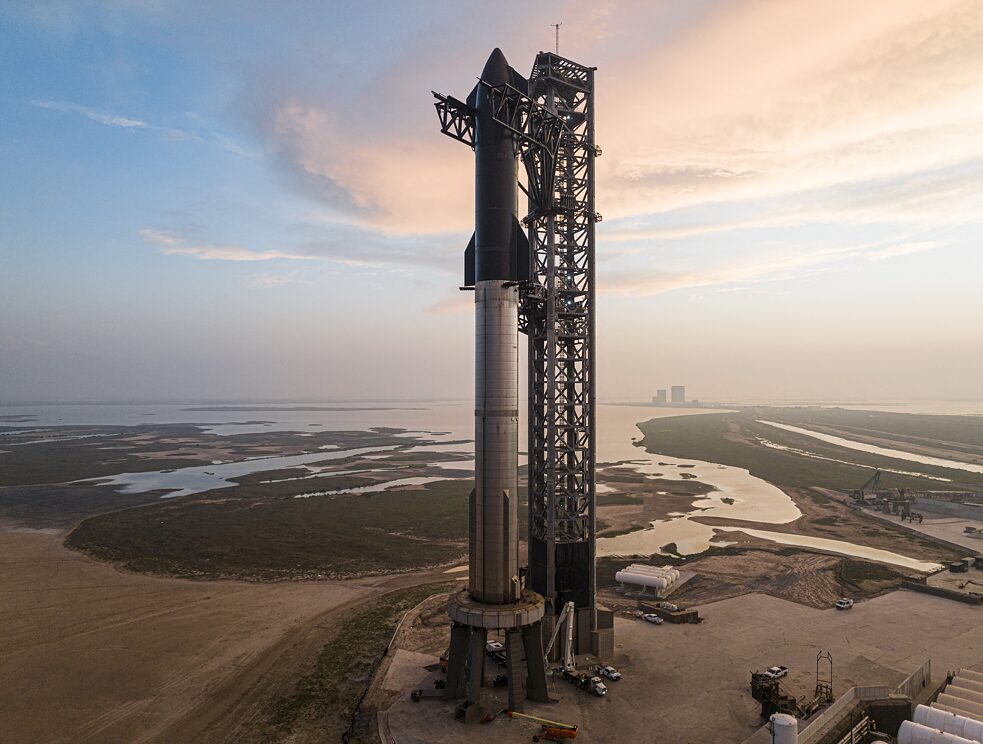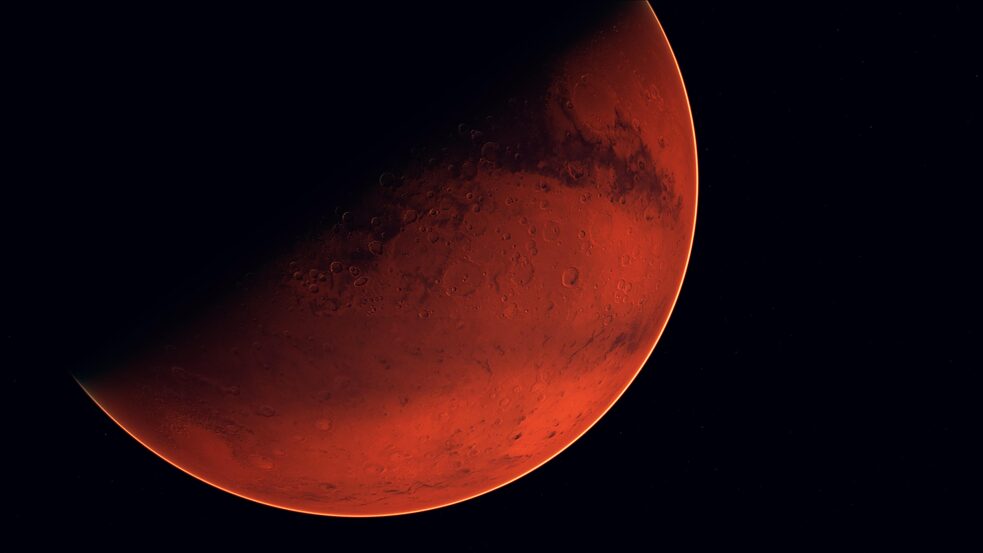Mars mission Migrating to Mars: Big Plans to Colonize the Red Planet

Spaceman hitchhiking to Mars | © picture alliance / Westend61 | Vasily Pindyurin
What was once considered the stuff of science fiction may become a reality in just a few decades: human life on Mars. What lessons can we learn from the past to avoid repeating the same mistakes on the Red Planet?
As 13-year-old Ellen clambers over rocks and boulders, the inside of her helmet, which ensures her air supply, fogs up. The sky overhead is yellow with dust storms sweeping across the upper strata of the atmosphere. Ellen is one of the first four children born on Mars – at least in Andreas Eschbach’s Das Marsprojekt. This five-part series of sci-fi novels is set in the year 2086, 30 years after the first settlement of the red planet. The books came out in the 2000s. “I was still young and optimistic back then,” says the German novelist with a chuckle. Now he can’t imagine his extra-terrestrial utopia becoming a reality by the end of the century.But Robert Zubrin can. Zubrin is an American aerospace engineer and the founder of Mars Society, an international NGO that advocates for a manned mission to Mars. He thinks we might be flying to Mars as early as 2030 – if tech giant Elon Musk’s SpaceX missions achieve their goal: to set up the first settlement on Mars by 2050 and then start transporting a million willing earthlings to colonize our neighbouring planet.
Private spaceflight looms large
But how realistic is this goal? “Elon Musk’s SpaceX company demonstrated that it is possible for a well-run lean and creative entrepreneurial organization to achieve things – and do so much faster – that were previously thought to require the efforts of major power governments,” writes Zubrin, whose research papers on Mars missions were used in Musk’s colonization plans.
Musk is reaching for the stars. Founded in 2002, his Space Exploration Technologies Corporation has been resupplying the International Space Station (ISS) since 2008. SpaceX launched its first manned spaceflights in 2020, and a year later its first orbital launch of an all-private crew, i.e. with no professional astronauts aboard.
 SpaceX Starship stands on the launch pad ahead of a flight test from Starbase in Boca Chica, Texas, USA
| © picture alliance / abaca | ABACA
Michaela Musilova is critical of this development. The astrobiologist has organized 40 simulated moon and Mars missions, 30 of which she commanded herself. She feels that manning missions with private persons runs the risk of repeating past mistakes.
SpaceX Starship stands on the launch pad ahead of a flight test from Starbase in Boca Chica, Texas, USA
| © picture alliance / abaca | ABACA
Michaela Musilova is critical of this development. The astrobiologist has organized 40 simulated moon and Mars missions, 30 of which she commanded herself. She feels that manning missions with private persons runs the risk of repeating past mistakes.“The more power these rich people have, the more they’ll bring back the colonial mindset of the past,” says the Slovak scientist. “They’re beginning to dictate their rules and ruthlessly impose their own ideas.” Their personal interests are taking precedence over the purposes that space exploration should serve for humankind. Musilova cites SpaceX’s 2018 PR campaign as a case in point: it involved launching Elon Musk’s own car, a red Tesla Roadster, into space – without any official authorization. Nor was the car sterilized beforehand, which is an absolute no-no in space travel and infuriated her: “We’re still hoping to find life on other planets,” she explains, “and can’t risk contaminating habitats that function differently from our planet Earth.” That’s why there are rules to keep space missions from contaminating other planets, moons, asteroids and even comets with terrestrial germs and other microorganisms from Earth.
The current developments remind Musilova of the space race in the 1950s and 1960s between the United States and the Soviet Union. Only now the contenders are tycoons. As a result, safety often gets short shrift. “To stay on top, these people are more inclined to take risks,” she warns. “Which can cost human lives.” Consequently, she’s calling on the international community to crack down on billionaires who are hell bent on imposing their own visions of space travel and flouting any rules that get in their way. “We need international standards and we must see to it that they’re respected by the private sector, too – in space travel as well as within their own companies,” insists Musilova.
Who gets to colonize Mars and how?
Colonizing Mars is still a pipedream for the time being, but it could be a reality by the end of the century. What would such a settlement be like? Who’d live there and what might be the political consequences if corporations get to colonize the Red Planet first?
In Andreas Eschbach’s novels, the first community on Mars is governed from the planet Earth, for which purpose, a proconsul is sent to Mars. As the author himself puts it, the takeaway is: “Ideally, each community governs itself, following democratic rules.” He adds, however, that the founders of the settlement could stake claims to it. An eventuality that astrobiologist Michaela Musilova seeks to forestall. “In an ideal world,” she says, “the first Mars missions and settlements would be cooperative undertakings involving several countries under the aegis of the United Nations.” The private sector is indeed likely to play an important part in establishing the first settlement there, she concedes, but only as developers and suppliers of space technology. They shouldn’t take the place of governments.
Robert Zubrin agrees that the political system of any settlement on Mars has to be based on liberty. This is the only way for a settlement there to grow and thrive.“People won’t emigrate to Mars unless there’s a free system there that promotes creativity and innovation,” says the American space exploration expert. “For patents will be its main export.”
 red planet Mars in the starry sky
| © picture alliance / Zoonar | Stanislav Rishnyak
Above all, he adds, the first settlers will have to bring a sense of community with them. “All societies have certain things in common to create the necessary degree of solidarity,” he explains, “regardless of whether they’re technologically advanced or primitive societies.” Geophysicist Christiane Heinicke feels that diversity will be vital to the survival of a Martian settlement. “We assume the first humans on Mars will be there mainly to pursue scientific objectives and explore Mars,” explains the German researcher, who’s currently busy at the University of Bremen constructing a prototype for bases on the moon and Mars. Once the initial stages of exploration and development have been completed, she predicts, more and more people who aren’t scientists or engineers will be coming. Eventually, a functional Mars settlement will attract artists and tourists, too – as well as family members, of course. “The first child born on Mars is bound to be a major milestone of colonization,” adds the researcher.
red planet Mars in the starry sky
| © picture alliance / Zoonar | Stanislav Rishnyak
Above all, he adds, the first settlers will have to bring a sense of community with them. “All societies have certain things in common to create the necessary degree of solidarity,” he explains, “regardless of whether they’re technologically advanced or primitive societies.” Geophysicist Christiane Heinicke feels that diversity will be vital to the survival of a Martian settlement. “We assume the first humans on Mars will be there mainly to pursue scientific objectives and explore Mars,” explains the German researcher, who’s currently busy at the University of Bremen constructing a prototype for bases on the moon and Mars. Once the initial stages of exploration and development have been completed, she predicts, more and more people who aren’t scientists or engineers will be coming. Eventually, a functional Mars settlement will attract artists and tourists, too – as well as family members, of course. “The first child born on Mars is bound to be a major milestone of colonization,” adds the researcher.
Setting up Mars for colonization
This is one endeavour in which we can hardly look to the past to glean lessons for the future. “There are no real parallels in history,” says German novelist Andreas Eschbach. “A human colony on an alien planet will be a first.” And incomparable to our colonial past here on Earth, concurs Robert Zubrin: “Comparing colonizing Mars to colonizing an inhabited country on Earth is wholly inaccurate.” On Mars, rhapsodizes the American aerospace pioneer, humanity can dare to make a fresh start.And before making that fresh start, looking back will help us steer clear of past mistakes. Space exploration expert Musilova will not accept the colonization of Mars at any price: “Extraordinary stories have been written, imposing edifices have been built and amazing things invented in the past. The only question is: At what price? How many had to sacrifice their lives for the Pyramids to be built? And do we really want to commemorate people who achieve such historical milestones at others’ expense?” Which is why she is calling for international standards – and a community of nations to make sure companies comply. This, she says, is the only way to create a new home for people on Mars someday based on the principles of liberty and equality.